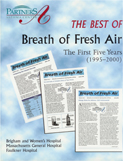Breath of Fresh Air: Feature Articles
Chapter 9: Leukotriene Blockers are a New Type of Athma Drug
Leukotriene (pronounced: lew - ko -TRY - een) is not exactly a household word. At first glance, development of a new medication that blocks the effect of this naturally occuring body chemical may not seem that exciting. However, years of scientific research have found that the leukotrienes are chemicals important in producing asthma, at least in some persons. The leukotriene blockers are therefore a new class of medication that is designed to treat asthma. In fact, the leukotriene blockers are the first truly new type of medicine discovered for the treatment of asthma in more than 20 years. |
Leukotriene blockers are the first new type of anti-asthma medication in more than 20 years. |
|
|
Hearing about a new development in asthma treatment, one is likely to have many questions. Is this new medicine appropriate for me? Will it take the place of any of my current medications? What side effects will it have? Do I need to take it every day? Some of these questions have answers that are known; other questions can only be answered after more persons with asthma have tried it and their physicians have gained experience with its use. It is safe to say that your own doctor will be the best source of infomation about how leukotriene blockers might best be used for you. In September the first of this new type of medication received approval from the Food and Drug Administration for use in the United States. The drug is called zafirlukast (ZA'-FUR-LEW''-CAST) and is marketed under the brand name Accolate®. It is sold in tablet form, 20 milligrams of zafirlukast per tablet, to be taken in most instances one tablet twice daily. It works best when taken on an empty stomach. Here is what we know about this medication now. It causes the bronchial tubes to open wider (that is, it acts as a bronchodilator) within hours of the first dose. The benefit increases with time over the first 2-3 weeks. In studies of patients with mild and moderate asthma, breathing capacity improved on average by approximately 16% (improved by one sixth). Unpleasant side effects are rare; no serious side effects have been reported. The only medication interaction of note is with the anticoagulant ("blood thinner") coumadin or warfarin. |
The first in this new category is zafirlukast (Accolate®), a tablet taken twice daily. |
|
|
In experimental trials investigating the effects of zafirlukast prior to its approval, some patients clearly benefited more than others. It is likely that persons with asthma who have lots of leukotrienes released onto their bronchial tubes as part of their asthma will benefit a great deal from this new leukotriene blocker. In other persons the leukotrienes may play a smaller role in causing their asthma, and the leukotriene blocker will be less effective. In general, there is currently no good way to determine whether or not your asthma involves large amounts of leukotrienes. One small group of persons with asthma is most likely to have high levels of the leukotrienes -- those who have an asthmatic sensitivity to aspirin. Persons whose asthma has worsened when they have taken aspirin or related medications (the non-steroidal anti-inflammatory drugs, such as ibuprofen and naproxen) are likely to derive particular benefit from leukotriene blocking medications. Many other persons with asthma may benefit as well, but it is not possible to anticipate the effect of the leukotriene blocker in advance of its use. Determining its role in any individual will likely be a matter of "trial and error", that is, trying it for a few weeks to assess its effect. |
Persons with asthma and aspirin-sensitivity are particularly likely to benefit. |
|
|
A difficult question to answer at this time is to what extent zafirlukast will replace other medications in a person's treatment program. Especially persons with asthma who need to take multiple anti-asthmatic medications or high doses of the inhaled steroids or steroid tablets for control of their disease will look to this new medication for relief from the burden of their current medications. As of the present time we do not have enough experience with this new type of medication to make strong predictions. We anticipate that for some persons with asthma, the leukotriene blocker may become their primary treatment whereas for others it may not add significantly to what they are already taking. Zafirlukast is the first of what is likely to be a number of new medications in this same or similar families: medicines designed to block the effects of the leukotrienes or to prevent their formation in the first place. This year — for the first time in over two decades — we have new tools to control asthma, and in the years ahead there will be more to follow. [Editor’s note: Since publication of this article, two additional medications that block formation or action of leukotrienes have also become available: montelukast (Singulair®) and zileuton (Zyflo®). Also, a very rare complication of the use of Accolate® and Singulair® has been described, occurring once in approximately 60 million patient-years of treatment with these medications. This reaction, called eosinophilic vasculitis or Churg-Strauss syndrome, involves allergic inflammation of multiple sites, including the lungs, heart, nerves, and skin. It has occurred almost exclusively in persons with severe asthma on daily prednisone, in whom the prednisone was withdrawn after starting the leukotriene blocker.] |
In any one person, it is
difficult to predict the reaction to a leukotriene blocker.
One needs to try it for a few weeks to find if it works for
you. |

